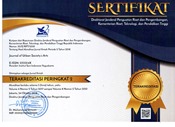LEGITIMATION OF RELIGIOUS MUSIC OF SABYAN GAMBUS’ SONG “DEEN ASSALAM” AS A PERCEPTIVE RESPON TO ISLAMIC RADICALIZATION IN INDONESIA
Abstract
Islam is often referred as being a radical movement or activity. Sabyan Gambus, through their song cover, responses to the situation in their song “Deen Assalam”. This song was created as an effort to minimize and reduce the society’s misthinking on the concept and implementation of Islamic teaching. Thus, a study of values implied in the song becomes essential to view such a perception shift within the society as a legitimation upon the work as well as the positioning of Islam in the structural world of Indonesian people. An analysis of the song lyrics is, accordingly, essentially needed.
The theory of Riffaterre is applied to study the song lyric. Meanwhile, a theory of Bourdieu is employed to review the legitimation achievement of the work production practices. The behaviorism method is used in analyzing the agents’ behaviors during the production process to reach a legitimation that can be considered as shifting of position and perception of the society.
The legitimation of Sabyan Gambus’ works by analyzing the response from the society can be considered as some possibilities of the emergence of a more moderate Islam in Indonesia. The analysis of internal meaning may also create some possibilities to audience to gain the power of value that affects the power relation and other external factors. Therefore, both internal and external work analyses are necessary to show the influence of work production and its legitimation achievement on its position and perception of the society.
Keywords
Full Text:
PDFReferences
Amin, M. I., Haryani, T. N., Arifah, N. H., & Husna, A. M. (2019). Islamic Education in Supporting De-radicalization: A Review of Islamic Education in Pondok Pesantren. Nadwa, 12(2), 259. https://doi.org/10.21580/nw.2018.12.2.2581
Berger, P. L., & Luckmann, T. (1991). The Social Construction of Reality: A Treatise in the Sociology of Knowledge. England: Penguin Books.
Bourdieu, P. (1993). The Field of Cultural Production: Essays on Art and Litarature. (R. Johnson, Ed.). United State: Columbia University Press.
Daulay, F. F. (2018, June). Bikin Merinding, Lagu Deen Assalam Begitu Populer Ternyata Memiliki Pesan yang Dalam. Tribun Medan.Com, p. 3.
Elster, J. (1986). An Introduction to Karl Marx. New York: Cambridge University Press.
Harmawati, Y., Abdulkarim, A., & Rahmat. (2016). Nilai Budaya Tradisi Dieng Culture Festival sebagai Kearifan Lokal untuk Membangun Karakter Bangsa. Journal of Urban Society’s Arts, 3(2), 82–95. https://doi.org/10.24821/jousa.v3i2.1477
Jenkins, R. (2006). Key Sociologists Pierre Bourdieu. New York: Routledge.
Putri, B. U. (2019, March). Nisa Sabyan Didekati Kubu Prabowo Sejak Tahun Lalu. 9 Maret.
Riffaterre, M. (1978). Semiotics of Poetry. Bloomington: Indiana University Press.
Saearani, M. F. T. bin, Simatupang, G. L. L., Soedarsono, R. M., & Kusmayati, A. M. H. (2014). Cultural Transformation Processes in the Current Development of Yogyakarta-Style Classical Dance. International Journal for Innovation Education and Research, 2, 134–141.
Sahlan, A., & Mulyono. (2012). Pengaruh Islam Terhadap Perkembangan Budaya Jawa: Tembang Macapat. El Harakah: Jurnal Budaya Islam, 14(1), 101–114.
Santoso, V. (2017). Kapital dan Strategi Garin Nugroho dalam Proses Produksi Film. Journal of Urban Society’s Arts, 4(1), 11–18. https://doi.org/10.24821/jousa.v4i1.1492
Sasongko, A. (2017, July). Pemikiran dan Kontribusi Al Farabi.
Sujatmiko, B., & El Ishaq, R. (2015). Pesan Dakwah Dalam Lagu “Bila Tiba.” Komunika Jurnal, 181–195.
DOI: https://doi.org/10.24821/jousa.v6i2.3866
Refbacks
- There are currently no refbacks.

This work is licensed under a Creative Commons Attribution 4.0 International License. ISSN 2355-2131 (print) | ISSN 2355-214X (online).






